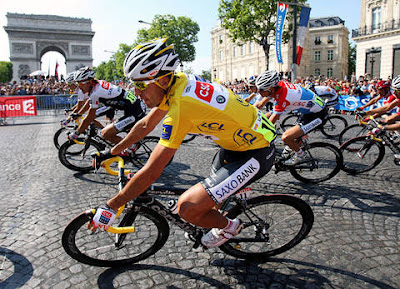
The finish of the Tour de France takes place now, with laps around the Tuileries Gardens, Le Champs and, of course, the Arc de Triumphe (photo of Carlos Sastre of Spain winning last year's race from the Independent). Brit Mark Cavendish leads the last stage sprint to prove he is for real - he is otherwise fourth. Speeds, including cobblestones on the Place de la Concorde, are 25-30km per hour. The race otherwise all about the peloton, or a "moving platoon" of cyclists described, in elegant detail, by wikipedia:
"
The peloton travels as an integrated unit, each rider making slight adjustments in response to the riders around him (or her) (particularly the one in front of each). When developed, riders at the front are exposed to higher loads, and will tend to slip off the front in order to rejoin the pack further back. In some cases, with sufficient room to maneuver, this will develop into a fluid situation where the center of the peloton appears to be pushing through its own leading edge.
The shape or formation of the peloton changes according to many factors. A strong headwind or a hard effort tends to spread-out or string-out the riders, while a slow tempo or tailwind tends to bunch up the peloton into a wider formation. Side wind forces the peloton to form into echelons in the direction of the wind. Often, the width of the road forces the peloton to form into several echelons. When more than one group of riders want to contest control of the peloton, several lines may form racing one another.
While only the riders exposed to the wind at the front (and the windward side when there is a significant crosswind) of the peloton are the ones doing most of the work, it is usually advantageous to be positioned closer to the front of the peloton. One reason is to avoid being affected by the 'elastic band effect' in which a change in speed becomes amplified as it propagates to the back of the peloton. The rider riding behind a rider who is changing his/her speed must make the adjustment at a slightly faster rate (due to reaction time) to avoid collisions.
Moreover, being closer to the front means that the rider can react to attacks and changes in position with less effort. Gaps sometimes form in the peloton, and being closer to the front also reduces the risk of getting caught in the rear group when the peloton breaks form. Also, the chance of ending up in a crash declines when nearer to the front, because the frontmost riders have the fewest fallen riders to evade. Finally, being at the front of the peloton means dictating the tempo to some degree, and some teams or groups of riders may prefer different speeds as part of their tactics. Being at the front of the peloton is also necessary to initiate a breakaway.
Tactical factors also apply. Teams generally attempt to cluster their members in the peloton in order to maximize their ability to affect the pack as a whole. For instance, if a team member is currently in a breakaway in front of the peloton, it is advantageous for the remaining members to slow the peloton as much as possible in an attempt to avoid catching the breakaway. This can be particularly effective in tight turns or narrow roads, where a single team can block the progress of the pack if they are in a favorable position. A similar situation occurs at the end of the race when teams will cluster in front of their sprinter, blocking the wind as long as possible while still leaving an open path in front for the sprinter to break out near the finish line.
It is typical for large hills to split up pelotons, as the aerodynamic factors are less important at the slower climbing speeds, and power-to-weight ratio is the key determinant of speed.
"
Alberto Contador of Spain is the overall winner while Cavandish leads a powerful charge to become the first British cyclist to win the Paris stage.
 I am not the only one who sees a striking similarity between Peggy Hill and Sarah Palin other than the fact that they are cartoon like characters with an attractive form.
I am not the only one who sees a striking similarity between Peggy Hill and Sarah Palin other than the fact that they are cartoon like characters with an attractive form.



















